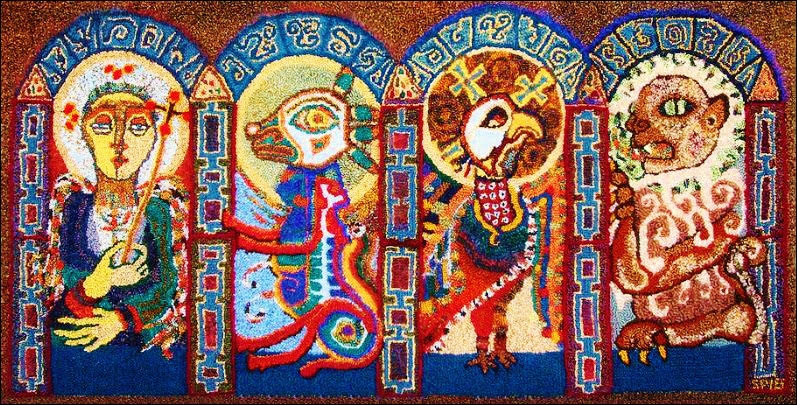A Critical Review of Sayed Modarresi's Book
Recently I read a short book called The Lost Testament: What Christians Don’t Know About Christ, by Sayed Mahdi Modarresi. It’s a provocative title. It was loaned to me by a dear Muslim neighbor who wanted me to read it, so I did. Out of respect for her, and from a desire to compile my reactions to the author’s main argument and sub-points, I decided to write this review. In general, I love the idea of a book esteeming the words of Jesus, which is captured so beautifully by these words on the back cover.
“The Words of Christ are so exquisite they make Aristotle seem sophomoric. His proclamations against corruption and injustice are so zealous, a million Ghandis would kneel down before him. His erudition is so profound, it is divinely inspired verses, not mere creations of the mind of a man that he was.” (p. 20)
As a Christian, I couldn’t agree more. Unfortunately, my agreement doesn't go much further. Despite Modarresi's apparent reverence for Jesus, he is the Jesus of Islam, not of Christianity. This book is actually a polemic against the Bible.
How and Where it Shows up in Philosophy, Culture and Religion
by Scott Cherry—
Society craves icons, or heroes. And why is that? Russell Brand can mock this craving all he wants, but I doubt he is above it. Could it be that we actually need great people and exemplars in the world? Could it be that a kind of hero-recognition code has been ‘pre-installed’ into our collective psyche that even spawns some of them? I mean, not that it would be unjustified—there are an awful lot of disturbing maladies and crises in the world. Who does not (openly or secretly) yearn for a Superman or a Wonder Woman, or a whole team of heroes like the Avengers? And isn’t that why the Marvel Avengers series and other superhero movies have been so wildly successful and seem never to stop being popular? The glaring thing, of course, is that the world’s problems are too big and too numerous even for them. We are desperate for great Humanitarians and lots of ordinary ones too. We rightly crave them and we should all want to become one. Humanity is in no position to disparage people who want to do great good for the world and have the means to do it. On the other hand, an actualized “messiah complex’ can produce a dangerous kind of person if not tempered by love, humility, and compassion, etc. Not everybody is qualified to be a “messiah”. Actually very few.
The legal system should return to the reasonableness of biblical standards.
by Jen Foster—
In law, the relationship between criminal intent and culpability is convoluted and inconsistent because the justice system has chosen dubious psychological assumptions to undergird its precedents and statutes. A new framework, scientism, has emerged which attempts to standardize these sometimes contradictory judicial laws through breakthroughs in neuroscience. But rather than justifying the psychological assumptions, comprehensive neuroscience actually requires the justice system to adopt a more biblical framework for culpability in criminal intent. Psychology has always suffered in the eyes of the law from a lack of hard science. As scientism has emerged as society’s new favorite idol, neuroscience offers psychology a much-needed justification for diminished moral culpability. Unfortunately for psychology, it is only by misrepresenting and twisting facts that they gain scientific strength for their position.
How and Where it Shows up in Philosophy, Culture and Religion
by Scott Cherry—
Society craves icons, or heroes. And why is that? Russell Brand can mock this craving all he wants, but I doubt he is above it. Could it be that we actually need great people and exemplars in the world? Could it be that a kind of hero-recognition code has been ‘pre-installed’ into our collective psyche that even spawns some of them? I mean, not that it would be unjustified—there are an awful lot of disturbing maladies and crises in the world. Who does not (openly or secretly) yearn for a Superman or a Wonder Woman, or a whole team of heroes like the Avengers? And isn’t that why the Marvel Avengers series and other superhero movies have been so wildly successful and seem never to stop being popular? The glaring thing, of course, is that the world’s problems are too big and too numerous even for them. We are desperate for great Humanitarians and lots of ordinary ones too. We rightly crave them and we should all want to become one. Humanity is in no position to disparage people who want to do great good for the world and have the means to do it. On the other hand, an actualized “messiah complex’ can produce a dangerous kind of person if not tempered by love, humility, and compassion, etc. Not everybody is qualified to be a “messiah”. Actually very few.
The Sum of the Parts: Not only did Jesus DO miracles, he WAS the miracle.
It has been said that the test of a person’s greatness is their use or abuse of power. On this score how did Jesus fair, we may ask?
The four gospels’ collective portrait of Jesus is not just that he was a doer of miracles, but that he was himself a miracle. In all of world history, never has there been any other historical figure to whom so many miracles have been attributed, from birth to death—nay, even beyond death. Never another historical figure to whom so much other-worldly power has been ascribed—power over disease and disability, power over nature, power over demonic forces, power over discourse, and power over death itself. In conjunction, never has there been an historical figure to whom so much humanitarian goodness has been attributed. Power and goodness.
